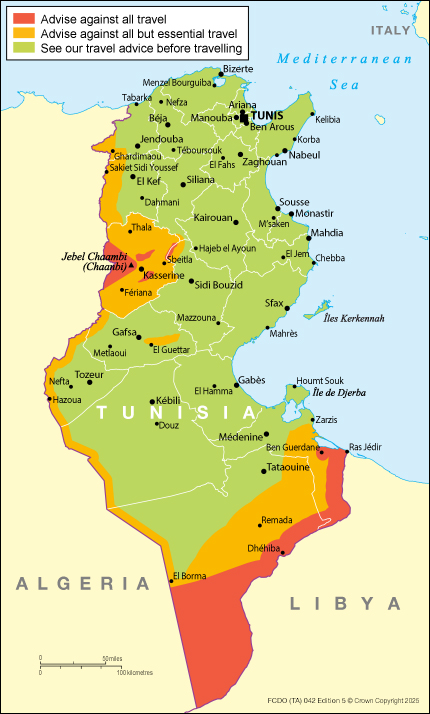Tunisia
Warnings and insurance

Your travel insurance could be invalidated if you travel against advice from the Foreign, Commonwealth & Development Office (FCDO).
Areas where FCDO advises against travel
Western Tunisia, including the Tunisia-Algeria border
FCDO advises against all travel to:
- the Chaambi Mountains National Park
-
the designated military operations zones:
- Mount Salloum
- Mount Sammamma
- Mount Mghila
This is due to cross-border terrorist activity and operations by the Tunisian security forces.
In addition, FCDO advises against all but essential travel to:
- areas north and west of the town of Ghardimaou in Jendouba Governorate, including El Feidja National Park
- within 20km of the Tunisia-Algeria border in El Kef and Jendouba governorates, south of the town of Jendouba
- Kasserine Governorate, including the town of Sbeitla
- within 10km of the rest of the Tunisia-Algeria border south of Kasserine Governorate
- within 10km of Mount Mghila
- Mount Orbata
Southern Tunisia, including the Tunisia-Libya border
FCDO advises against all travel to:
- the militarised zone south of the towns of El Borma and Dhehiba
- within 20km of the rest of the Tunisia-Libya border area north of Dhehiba
- the town of Ben Guerdane and immediate surrounding area
This is due to cross-border terrorist activity and fighting in Libya.
In addition, FCDO advises against all but essential travel to within 75km of the Tunisia-Libya border, including Remada and El Borma but excluding Zarzis, the C118 road and all areas in Medenine Governorate north of the road.
Find out more about why FCDO advises against travel.
Temporary safety measures
Following a severe storm on 20-21 January, local authorities in Sidi Bou Said have introduced temporary safety measures, including restrictions on buses and heavy vehicles and the closure of some roads and pedestrian zones, to reduce the risk of landslides.
Monitor local media and follow the advice of local authorities.
Before you travel
No travel can be guaranteed safe. Read all the advice in this guide and any specific travel advice that applies to you:
- women travellers
- disabled travellers
- LGBT+ travellers
- solo and independent travel
- volunteering and adventure travel
Travel insurance
If you choose to travel, research your destinations and get appropriate travel insurance. Insurance should cover your itinerary, planned activities and expenses in an emergency.
About FCDO travel advice
FCDO provides advice about risks of travel to help British nationals make informed decisions. Find out more about FCDO travel advice.
Get travel advice updates
Sign up to get email notifications when this travel advice is updated.
Follow FCDO: